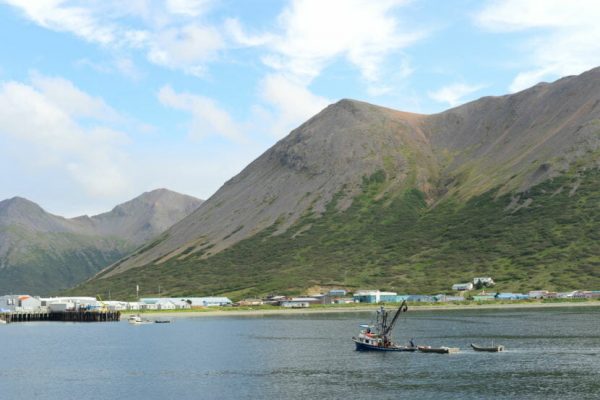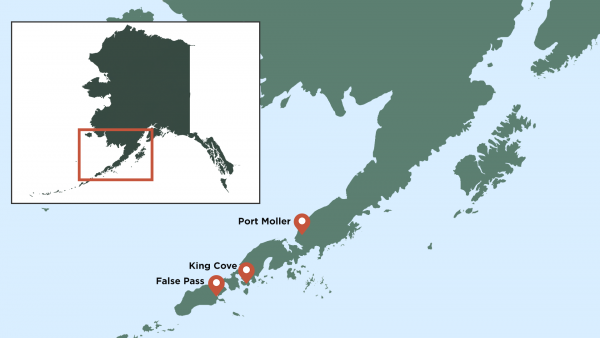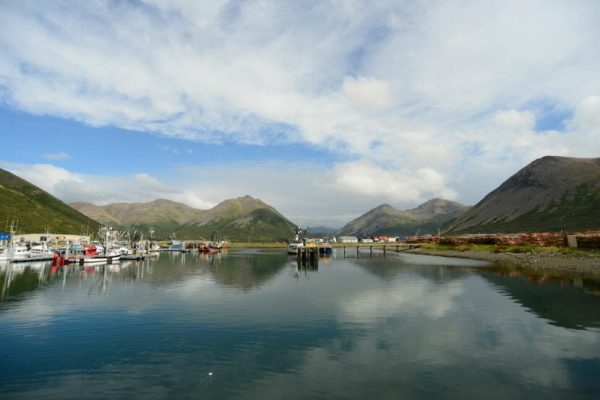
For the fishermen of King Cove, the 900-person town near the tip of the Alaska Peninsula, the construction of a new fish processing plant in a nearby village came as welcome news.
King Cove has long been a company town. For decades, its fishermen were frustrated by Peter Pan Seafoods, the private company that runs King Cove’s own massive processing plant. Especially vexing were the limits: While another processor in the region was buying far more salmon, Peter Pan would only buy 35,000 pounds from each boat, each day, said A.J. Newman, a King Cove city council member who skippers the 58-foot Lady Lee Dawn.
“It’s hard to watch your friends catch double what you caught,” said Newman. “Peter Pan had too many boats, and they couldn’t handle all the fish. And we just didn’t feel like they were hearing us — for years, we told them our concerns and they just didn’t really listen.”
Newman now sells his fish to the new plant, operated by Silver Bay Seafoods in the tiny village of False Pass, 45 miles west. And he’s not the only fisherman who broke up with Peter Pan — more than half of King Cove’s seine fleet switched to delivering their salmon to False Pass last summer.
The competition among processing companies is making things “way better” for King Cove’s fishermen, Newman said. But it’s also causing new problems.
The migration of the town’s fishermen to the Silver Bay plant in False Pass has left King Cove with a massive budget hole. And a possible realignment of Alaska’s seafood industry is threatening the future of the Peter Pan plant and viability of King Cove itself.
Silver Bay Seafoods’ chief executive, Cora Cambell, declined to comment. But King Cove officials say they hold no grudge against the company for opening up the competing plant in False Pass, and they note that it’s taken steps to soften the impact, like opening a new marine parts store in King Cove.
But the financial blow has been undeniable, and a solution remains elusive.
In a typical year, King Cove’s fish tax revenues are some $1.5 million, or a little more than half of its $2.8 million in general fund revenue. With last year’s opening of False Pass’ competing plant, King Cove officials estimate that they’ve lost of some $650,000 in revenue, or nearly 25 percent of their yearly total.

Even worse, potentially, is this month’s news that Peter Pan Seafoods is being put up for sale by its Japanese owner, the seafood conglomerate Maruha Nichiro. After the construction of the new False Pass plant and reconstruction of a fire-damaged plant not far away in Port Moller, experts say there’s now far more processing capacity than necessary along the Alaska Peninsula — making a shakeup likely that could end with players or plants shutting down.
“Everybody is wondering: why such an arms race in a place where you really don’t have enough resource?” said John Fiorillo, executive editor of the trade publication IntraFish Media. He added: “Somebody’s going to be a casualty.”
Peter Pan’s chief executive, Barry Collier, didn’t respond to requests for comment, and the company hasn’t said anything publicly about the King Cove plant’s future. It’s not clear exactly what will happen to the plant or who might buy it.
In the meantime, King Cove’s city council is trying to sort out which services they’re going to have to cut. That could include hours at the town’s teen and rec centers, along with a program that helps seniors pay for their utilities.
“To pick on kids, and to pick on seniors, that’s a lot of emotions,” said Gary Hennigh, King Cove’s city administrator. “This is really what the mayor and the council are struggling with — that we know the value and the pride and the reasons that we have done these things, but the times are changing and we can’t afford them.”
The city council is trying to be careful not to cause a panic, Hennigh said. But the history of the isolated fishing towns of the Aleutians and the Alaska Peninsula is also at the back of people’s minds. A resolution passed by King Cove’s city council last month noted the “disappearance” of other communities, when their fish processing activities and plants shut down.
“The city must, and will do, everything within our ability to not let history repeat itself in this regard, and to sustain our quality of life and socioeconomic and cultural identity and well-being,” the resolution said.
King Cove isn’t the only village in the region that’s suffering amid a downturn in the region’s fishing industry: Another plant in the nearby town of Sand Point closed for the winter amid a crash in cod stocks linked to global warming.
[Read more: Trident’s Sand Point plant closed for the winter due to low cod stocks]

“We’ve got to start educating our fellow citizens that things are happening that we really don’t have control over,” Hennigh said. “With a little bit more time and hopefully a little bit more good news, maybe we’ll end up being okay. But we’re certainly not close to that now.”
There have been a few pieces of good news amid the bad news about Peter Pan, like Silver Bay Seafoods’ new marine parts store and a $100,000 grant to King Cove from the local borough, Hennigh said.
But until the village finds out what’s happening to Peter Pan’s processing plant, Hennigh says, King Cove will have to be very careful about how it spends its money.




